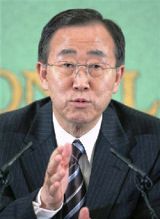UN’s Ki-Moon focuses on Darfur crisis
Jan 2, 2007 (UNITED NATIONS) — Ban Ki Moon said on his first full day at work as secretary-general of the United Nations that he would give diplomatic efforts to end the humanitarian crisis in the Darfur region of Sudan his “highest attention.”
 Ban, 62, spoke to reporters and staff members at UN headquarters in New York the day after he officially began his five-year term as the world body’s eighth leader, succeeding Kofi Annan.
Ban, 62, spoke to reporters and staff members at UN headquarters in New York the day after he officially began his five-year term as the world body’s eighth leader, succeeding Kofi Annan.
The former South Korean foreign minister signaled his determination to address the violence and privation in Darfur by placing his first and only official telephone call yesterday to Jan Eliasson, who last month was named UN envoy to Sudan.
“By engaging myself in the diplomatic process I hope we will be able to resolve peacefully this very serious issue,” Ban told reporters. “It is very high on my agenda.”
Ban said he would meet with Eliasson tomorrow in New York and that his first overseas trip as secretary-general would be to the African Union summit later this month in Addis Ababa, Ethiopia.
About 400,000 people have died in the conflict in Darfur since February 2003, and 2 million more have fled their homes. The violence began when Sudanese authorities organized nomadic herders and some Arab tribal militias into a counterinsurgency force known as the Janjaweed to attack villages supporting rebel groups.
Peacekeeping Issue
The UN has been trying to persuade Sudan’s government to accept a combined UN and African Union peacekeeping force of up to 20,000 troops in Darfur. President Umar al-Bashir accepts a three-phase plan that will lead to the force’s deployment, Annan told reporters last week.
Ban confirmed his intention to play a role in negotiations aimed at convincing North Korea to stop development of a nuclear arsenal.
“You can expect I will have much more attention and priority on this issue,” Ban said. “As secretary-general I will first try to facilitate smoother progress of the six-party talks. I will do my own role.”
Asked about the execution of former Iraqi dictator Saddam Hussein on Dec. 30, Ban said the issue of capital punishment was “up to each and every member state to decide.”
(Bloomberg)
